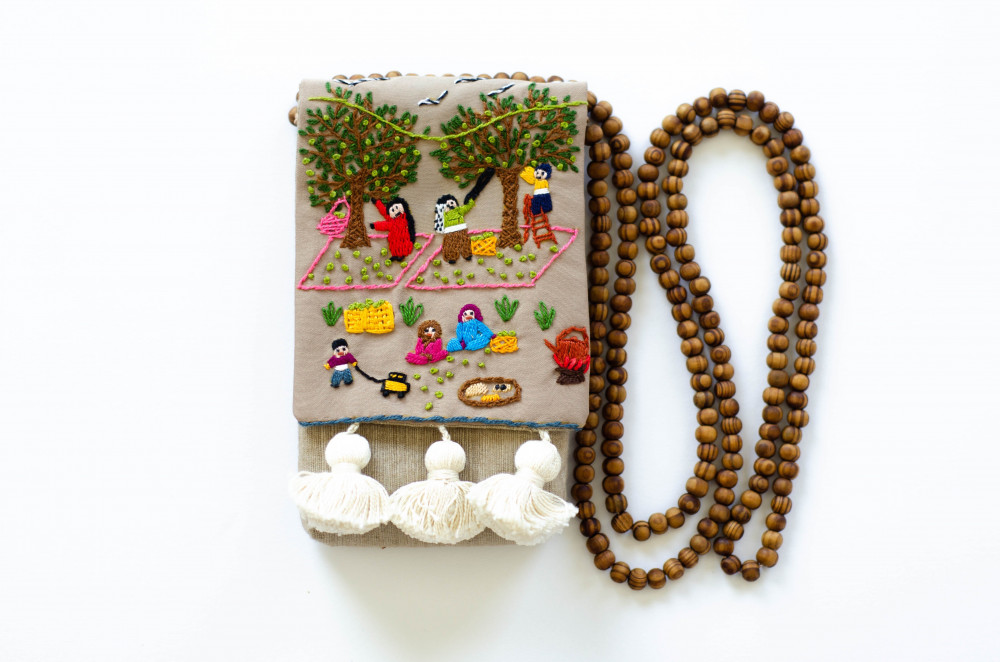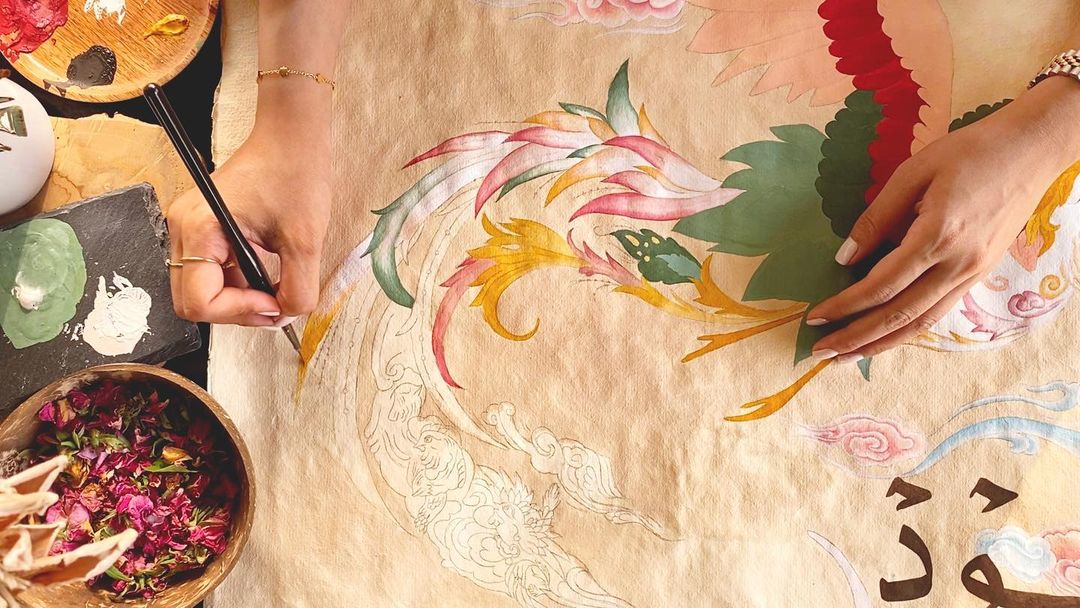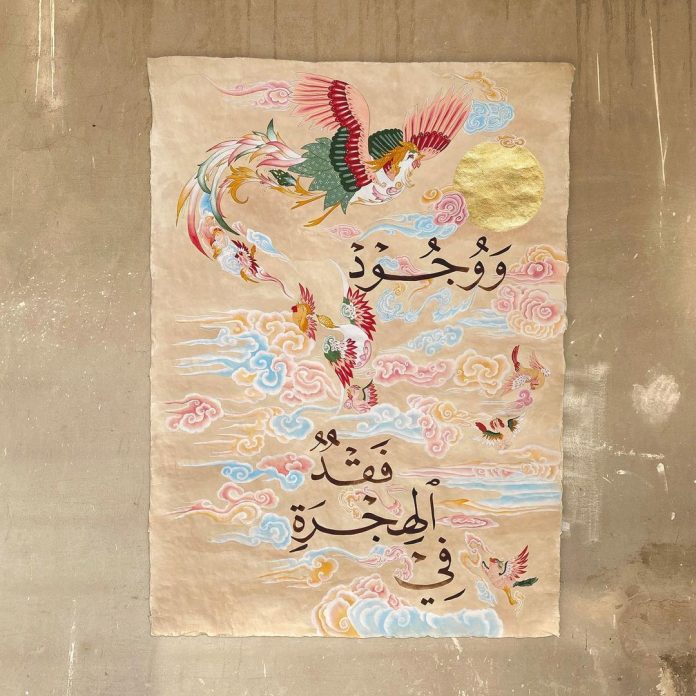JEDDAH: Women refugees and others facing hardship on the margins are developing their creative talents with the help of a Saudi fashion startup.
Bab Boutique was established in 2016 to give marginalized communities the space and resources to invest in their creativity, and to encourage female refugees and others to celebrate their identity and culture.
The boutique describes itself as a “platform to celebrate stories of survival, striving and invisible success through handcrafted pieces created with care and love.”
Bab Boutique was initially set up by Rafah Sahab, Asma Aljifri, Hessa Alrubian, Mariam Alrubian and Fajer Burhamah as a therapeutic activity to support and help Syrian women who had fled their war-torn homeland.

Sahab, a psychotherapist, said that the boutique’s founders were driven by the belief that mental health is just as important as physical well-being.
“The plan was to provide traditional one-to-one therapy sessions during my visits to refugee camps or by securing funds for local therapists in hosting communities like Lebanon and Jordan,” said Sahab.
However, after a few visits, Sahab realized that many refugees were looking for a job, not mental health support.
“I was humbled by their grit and determination to find ways to provide for their children,” she said. “So we joined with local partners to give them a chance to express their creativity.”
Sahab decided to replace the therapy sessions with handicraft work since it was clear that lack of employment was affecting the refugees’ sense of dignity and self-respect.

In collaboration with the Thekra Organization in Jordan, Bab launched its first collection, “Stories of Syria,” which featured hand-embroidered bags in different sizes that celebrated aspects of Syrian culture, including weddings, and the wheat and olive harvests.
“We asked the refugees what we could learn from Syrian culture, and the women began sharing stories that they loved, and these were converted into drawings which the women then embroidered,” said Sahab.
“We took care of selling the collection in the GCC market.”
The market for Bab Boutique’s hand-embroidered products is bigger than many might think, and includes devotees of slow fashion, sustainability, handicraft and environmentally friendly products.
As their efforts began to bear fruit, the boutique’s co-founders discovered that far from being helpers and the refugees victims, the relationship was more cooperative, educational and insightful for both parties.
“We learned that these people have a lot that they can teach us; they have culture, art and creativity that we can benefit from,” said Sahab.

“They are not just refugees, they are people with dreams, potential, capacity, ideas and skills, as well as pain and disappointments. They’re just normal human beings.”
Sahab said that her work with refugees has taught her that “inside every one of us there is a divine power; there is flexibility, and the ability to be creative and overcome hardship.”
In collaboration with Jeddah-based artist Doa Bugis, Bab Boutique recently introduced “Migrating Birds,” a new collection of finely embroidered bags by Syrian refugees in Lebanon based on art pieces created by Bugis, whose works focus on exploring grief, loss, migration and hybrid identities.
“I have been an admirer of Bab for years. The Stories of Syria collection caught my eye and have drawn me into Bab’s own narrative, values and ethics,” said Bugis. “Knowing what they stand for, I said yes without giving it a second thought.
“Migrating Birds has been brewing in my head for years. I’ve always been interested in hybrid identities and spent about six years researching the subject,” Doa Bugis told Arab News.
“One of the main factors behind mixed identities is migration. It has been a phenomenon rooted in history. People have always relocated for better jobs, opportunities and living conditions. Whether the reasons were religious, economical or educational, uprooting yourself and your family is not an easy journey.”

Bugis sketched this narrative with words and then translated it visually. After many attempts she finally created an eye-catching miniature painting that combined Islamic art and calligraphy.
The finely embroidered bags feature images of birds, and phrases such as “In migration, there is loss and existence.”
Bab now hopes refugees can be valued for the cultural richness they bring with them.
“We want to change the fact that money and property is the judge for someone’s richness. You can be financially poor, but rich in culture and art; we want to make this shift,” Sahab said.
She said that the startup hopes to foster a new approach to humanitarian work that will give people the capacity to build for themselves and sustain their lives.
Bab plans to continue working with refugees on special lines and collections, but is also working on building communities both inside and outside the Kingdom.

“We believe that Bab is an imperfect project, an ever-evolving process of trial and error,” said Sahab.
“We have a growth mindset. We try to have patience and work slowly against societal and business industry expectations.”
Although social entrepreneurship is a new concept in the Saudi market, Sahab is optimistic about the future.
“Social businesses were not popular in the past. However, recently new regulations were set to support them. I expect a better future for social startups and social entrepreneurship.”
Bab Boutique products are available online and at concept stores in Saudi Arabia. They can be found at https://babboutique.store and Instagram account @babboutique.me.







Christie’s launches charity auction to support Beirut art sceneUK mosque donates beds bought for care facility to homeless charity

